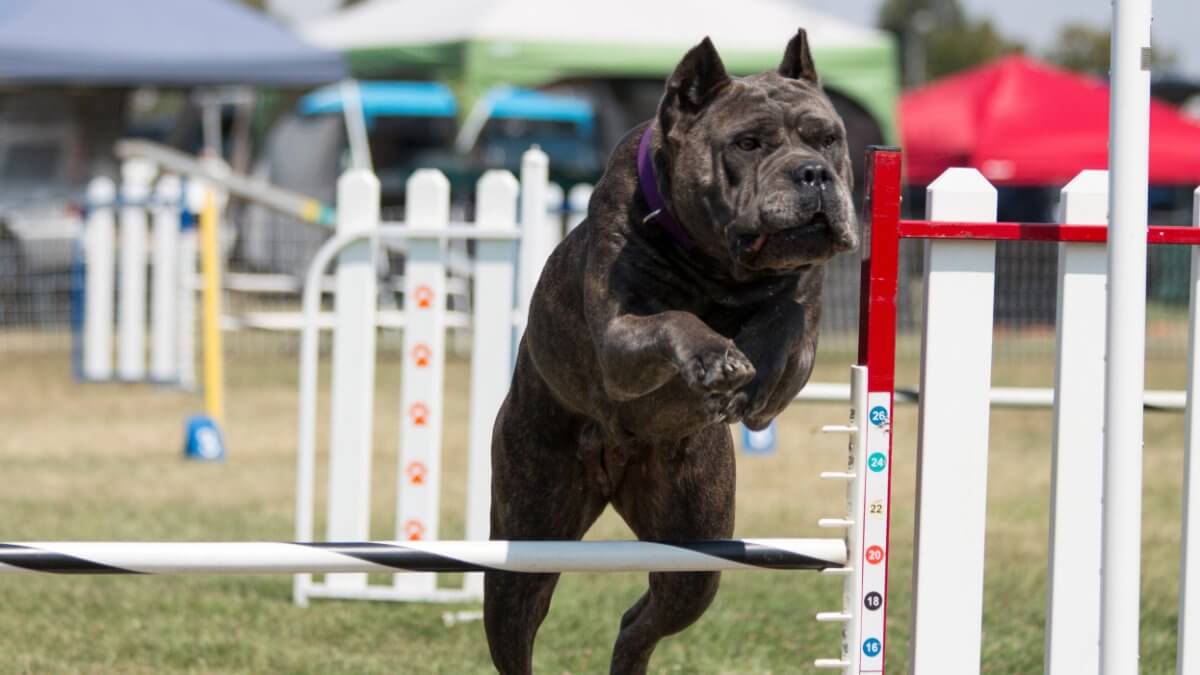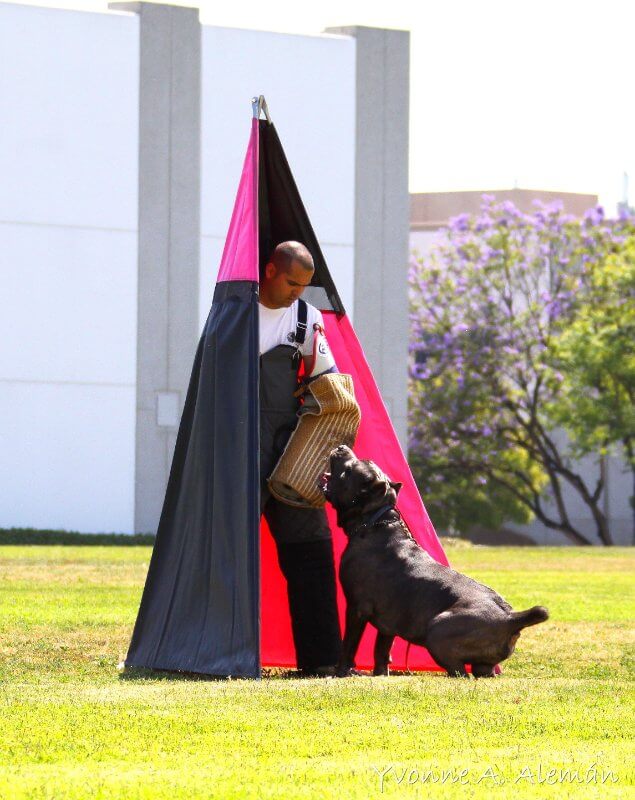


Home » Hello Cane Corso

This article was originally published in Showsight Magazine, February 2017 issue.
The question most often asked about the majestic Cane Corso is how to pronounce the breed name. Cane Corso is pronounced Kah-Nay Kor-So. Sometimes the breed name is shortened to Corso as well. The Cane Corso hails from Southern Italy. Before 1988, the Cane Corso was only found on rural farms and was considered an extremely rare breed of dog. The dogs were used as all-purpose farm dogs, a drover, herder and protector of livestock and the farmer’s home. In addition to farm work, the Corso was also used to hunt difficult game, such a wild boar and bears.
The first litter of Cane Corsos was brought to the United States by Michael Sottile, Sr. in 1988. Sottile, Sr. brought another litter to the US a few years later, it was a repeat breeding of the first litter. This was the start of the Cane Corso in America. Since then, many American breeders have brought Cane Corsos from Italy and other parts of the world into the US breeding pool. An official breed club was formed in 1993, as well as a registry, in order to serve as a Parent Breed Club and start documenting the dogs in the US. In 2003 the club’s membership voted to seek AKC recognition. By 2007, Cane Corsos were approved to compete in the AKC Miscellaneous Class and the breed received full recognition in the Working group in July 2010.
As evidenced by its original uses on the farm, the Cane Corso is a versatile and intelligent working dog. They are the smallest of the Mastiff breeds and some would argue, the most athletic. In addition to possessing a typical temperament that shows endless devotion to their people, the Cane Corso is easily trained to do many tasks. Cane Corsos thrive when they are allowed to problem solve. These traits make for excellent competitors in Obedience, Rally, Agility, Tracking, Barn Hunt, Carting, Weight Pull and Protection Sports.
While the number of Cane Corsos competing in Conformation events continues to increase, the number of Cane Corsos titling in AKC performance Events and non-AKC performance events is also increasing. In 2016 more than 80 AKC performance event titles were awarded to Cane Corsos. Compare the 2016 number to the number of AKC performance titles awarded in 2011 where only 42 titles were awarded to Cane Corsos. We have doubled the number of Corsos competing and titling in Performance events.
The Cane Corso Association of America, AKC’s parent breed club, offers many Club titles to members whose Cane Corsos have titled in Performance events both non-AKC and AKC events.
Each year the number of Club titles awarded is steadily increasing as well.

As puppies, Cane Corsos are full of energy and love to explore new things. Like mentioned earlier, they thrive when they are learning and as puppies when trained with a solid foundation of reward-based training, they do tend to retain all that they’ve learned rather well. Young Cane Corsos do require extensive socialization to new people, places and things. You cannot over-socialize this breed! Once a Corso reaches sexual maturity they may behave like teenagers–unruly, headstrong and defiant. If their foundation in training and socialization is solid and they have thoroughly bonded to their people, they will comply with their owners’ requests, eventually. It is this period of time where the notion of needing an experienced and confident owner takes precedence.
As a breed, the Cane Corso tends to only want to socialize with people it knows. While some Corsos are very outgoing and friendly with new people, this is not typical for the breed. The Cane Corso should never be aggressive unless provoked, instead they tend to just ignore a new person. I try to describe them as a dog that likes to play hard to get. If a stranger ignores them while chatting with their owner, after a minute or two, the Corso will gently nudge the strangers’ hand to be petted. However, if the stranger wants to go right up to them and start petting, a Corso will typically just turn her head away and act disinterested.
Cane Corsos feel the same way about new people as they do about new dogs. They prefer to ignore dogs that aren’t in their immediate pack. Generally speaking, the Cane Corso is not suited to dog park or doggy daycare types of places.
As its historical use implies, the Cane Corso still makes an excellent guard dog. They will bark at a fence to alert that there may be intruders, even if it is just the mailman. They notice when something is different in their home and they will investigate it thoroughly, like a new car parked in the driveway or new furniture in the house.
The breed does love children. They tend to have a natural instinct to be calm and gentle with children and the elderly. This trait is what can make them exceptional therapy dogs. Many Cane Corsos have been successful participants in the Reading with Rover Program. Reading with Rover is a program that some schools offer where children can read books to the dogs to help improve their reading skills.
All in all, the Corso makes a wonderful companion for someone who has training experience and enjoys including their dog in all their daily activities. This stunning and imposing breed of dog is a big teddy bear with its people but can be a fierce protector if called upon to dispel a threat. They are truly a jack-of-all-trades breed!